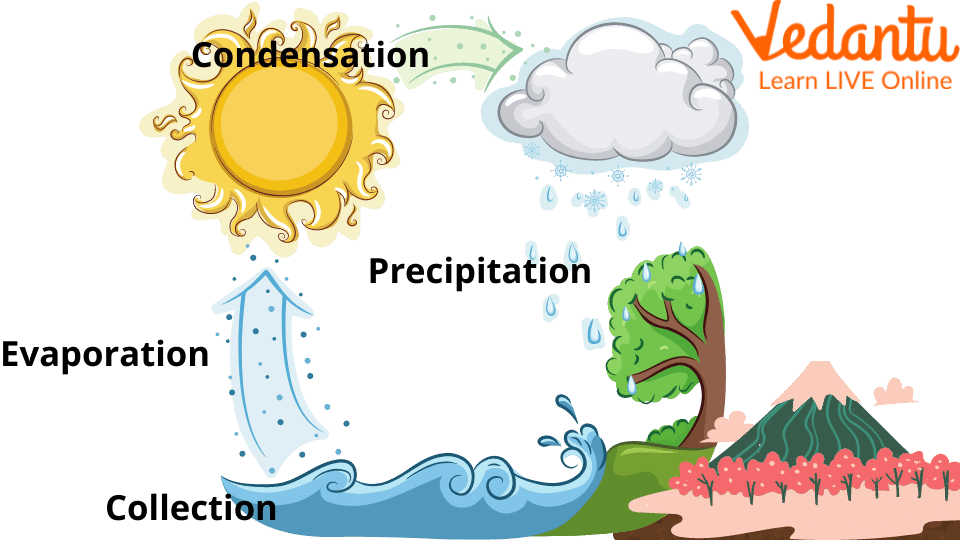




How the Water Cycle Impacts Our Daily Lives
Get a glass of water, fill it up, and sip. Did you know that the water you just ingested was the same water that King Tutankhamun, woolly mammoths, and the earliest humans drank? This is due to Earth recycling water for more than 4 billion years!
To define the water cycle, we can say that the water cycle is the name given to the continuous cycle in which water on the planet travels between lakes, rivers, seas, the atmosphere, and the land. It can be a solid (like water), a gas (like vapour), or a liquid (like air) as it moves through this continuous system (ice).
So, are you eager young geographers prepared to learn some shocking new information? Let us then examine the various phases of the beautiful water cycle.
The Water Cycle
The water cycle has four primary phases. Evaporation, condensation, precipitation, and collecting are the four processes. Let's examine each of these phases in turn.

The Water Cycle
Evaporation: Warmth from the Sun enables water from lakes, oceans, streams, ice, and soils to rise into the air and transform into water vapour through evaporation (gas). Droplets of water vapour combine to form clouds.
Condensation: It is the process through which airborne water vapour cools and reverts to liquid water.
Precipitation: This is the process by which water from clouds in the sky descends to the ground as rain, snow, hail, or sleet.
Collection: Water from the clouds gathers in the oceans, rivers, lakes, and streams as rain, snow, hail, or sleet. The majority will permeate (soak into) the earth and gather as underground water.
The Sun's energy and gravity force drive the water cycle. All of the water on Earth is heated by the sun, which causes it to evaporate, starting the entire cycle. The moisture is forced to return to Earth by gravity.
Importance of Water Cycle
Water is the life energy behind all of nature. Hence, it is true that "If there is magic in this world, it is contained in water."
Without water, life cannot exist on this lovely planet Earth. It exists as a solid, liquid, and gas in three different states.
The main and crucial components of the Earth's climate system, including the atmosphere, clouds, ocean, lakes, vegetation, snowpack, and glaciers, are all connected by water. The Water cycle connects various components of the climate system.
On Earth, water is essential for supporting both nature and life. The "water cycle" or "hydrologic cycle" is a cycle that describes how all of the water on Earth is always in motion.
The water continues to move on, above, and below the Earth's surface during this cycle. Water constantly shifts between the states of liquid, vapour, and ice. For millions of years, this rapid shift in the state of the water has been occurring continually. The water cycle is an essential process of all life.
Benefits of the Water Cycle
1. Freshwater is Essential for Human Life.
Water is essential to life on earth. Humans depend on drinking water to survive, and water makes up 60 to 70 percent of all living things. The water cycle is a critical process that controls our planet's weather patterns and ensures that water is available for all living things. We would run out of clean water, necessary for life, if water didn't naturally recycle itself and disperse freshwater across the world's entire surface.

Earth
2. Purification
Water is cleaned via evaporation and infiltration, which benefits human, animal, and plant life. Pollutants and sediments in water are left behind as it evaporates. The ground cleans the water as it infiltrates, removing impurities and pollutants. Snow, ice, and glaciers can serve as freshwater reservoirs for people and other living things. Since saltwater needs to be within specific pH and saline levels, aquatic life needs clean water.
3. Dispersion
The water cycle equitably distributes water across the world's surface. This is crucial because gravity would otherwise force all water into the oceans. Freshwater is continually provided through the water cycle to all forms of life, including people, animals, and plants. Runoff supports freshwater and marine life by feeding rivers, other freshwater bodies, and the ocean.
4. Life is Maintained by Water Cycle
Without precipitation, plants couldn't grow, which meant that anything eating plants couldn't live, and so on.
The water cycle process produces the ecosystems surrounding us and supports life. The water cycle can change in particularly sensitive ways to some organisms. A lengthy drought can wipe out a plant population, and some salamander species may need a specific soil saturation level to prevent desiccation.
5. Climate Impacts
Solar energy drives the water cycle, and 86% of the world's evaporation comes from the oceans, which cools them through evaporative cooling. Without the cooling, evaporation's impact on the greenhouse effect would result in a warmer planet and a surface temperature of 67 °C (153 °F).
Summary
The Water cycle plays an important role in the survival of life on earth. It involves four stages: evaporation, condensation, precipitation, and collection. The cycle keeps playing nonstop on the earth. This cycle helps in distributing water across the globe. This is the fundamental process that keeps terrestrial life sustained on earth.
FAQs on Fascinating Facts About the Water Cycle
1. What exactly is the water cycle?
The water cycle is the continuous journey water takes on Earth. It moves from the ground to the sky and back to the ground again in a never-ending loop. This natural process ensures that all living things have the fresh water they need to survive.
2. What are the main stages of the water cycle?
The water cycle has four main stages that happen in a sequence:
- Evaporation: The sun's heat turns water from oceans, lakes, and rivers into a gas called water vapour, which rises into the air.
- Condensation: As the water vapour rises and cools, it turns back into tiny liquid water droplets, which come together to form clouds.
- Precipitation: When the clouds become too heavy with water, the water falls back to Earth in the form of rain, snow, or hail.
- Collection: The water that falls to Earth is collected in oceans, lakes, and rivers, and the entire cycle starts over again.
3. Can you share some interesting facts about the water cycle for kids?
Certainly! Here are a few amazing facts about the water cycle:
- The sun's energy is the main force that powers the entire water cycle.
- Plants also release water vapour into the air through a process called transpiration.
- The water you drink today might be the same water a dinosaur drank millions of years ago because it is constantly recycled.
- A single water droplet might stay in the atmosphere for about 10 days before it falls as rain.
4. Why is it called a 'cycle'?
It's called a 'cycle' because it has no real starting or ending point. The same water is constantly moving and changing forms—from liquid to gas and back to liquid again. It goes round and round in a continuous loop, which is why we call it the water cycle.
5. What would happen if the water cycle stopped working?
If the water cycle stopped, life on Earth as we know it would end. There would be no more rain, which means rivers, lakes, and streams would dry up. Plants and animals would not have water, and our planet would slowly turn into a hot, dry desert. The water cycle is essential for keeping our planet alive.
6. Is new water ever created on Earth?
No, the amount of water on our planet has remained the same for billions of years. New water is not created. The water cycle simply recycles the Earth’s existing water over and over again. The water we have now is the same water that has always been here.
7. How does the water cycle help clean the Earth's water?
The water cycle is like a giant, natural water filter. When water evaporates from oceans and lakes, it leaves behind salt, dirt, and other pollutants. The water vapour that forms clouds is pure. When it falls back to Earth as rain, it is fresh and clean, making it safe for us and all living things to use.
8. What is the difference between evaporation and condensation?
The key difference is the change in water's state. Evaporation is when liquid water heats up and turns into a gas (water vapour). Condensation is the opposite; it's when that gas cools down and turns back into a liquid (tiny water droplets that form clouds).





















